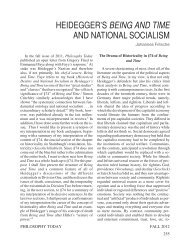SPINOZA'S VIRTUOUS PASSIONS
SPINOZA'S VIRTUOUS PASSIONS
SPINOZA'S VIRTUOUS PASSIONS
Create successful ePaper yourself
Turn your PDF publications into a flip-book with our unique Google optimized e-Paper software.
766 MATTHEW J. KISNER<br />
when considering our dependency on the basic necessities of life.<br />
“The human body needs for its preservation a great many other bodies,<br />
by which, as it were, it is continually regenerated” (2p13post4). 18<br />
To the extent that these bodies are necessary for our survival, it is<br />
advantageous to be passively affected by them (4p39). 19 Furthermore,<br />
Spinoza recognizes that securing our well-being requires social organization<br />
and a state (4p40; see also 4p35c1). Any minimal distribution<br />
of labor in a society requires us to depend upon the labor and contribution<br />
of others for our well-being. In this way, being passive to others<br />
is also to our advantage.<br />
A possible motivation for Spinoza’s view on the value of passivity<br />
is that, for Spinoza, it is necessary that we are always passive to some<br />
degree, so that, if we are going to increase our power at all, it must be<br />
possible to do so passively. Our necessary passivity follows from<br />
Spinoza’s definition of passivity as being an inadequate or partial<br />
cause: “we are passive when something takes place in us, or follows<br />
from our nature, of which we are only the partial cause” (3def2). It<br />
follows from this definition, first, that we are passive anytime that we<br />
bring about something through the cooperation of other things. For<br />
instance, one would be passive when building a sandcastle with the<br />
assistance of friends or, even, tools. In fact, since the sandcastle<br />
comes about partly through the power of the sand to maintain its<br />
shape and so forth, one would be passive to some degree even when<br />
building the sandcastle entirely with one’s own hands. It follows, second,<br />
that we are passive anytime something acts on us: for something<br />
to act on us, it must bring about some change in us; otherwise, we<br />
would not say that the thing has exerted any causal power over us.<br />
Since such a change is partly brought about through the power of the<br />
thing, we are at best an inadequate cause of such change and, thus,<br />
passive. 20 It follows that a fully active person would not really<br />
18<br />
As an example, he claims that we require many different kinds of food<br />
in order to nourish all the parts of our body (4app27).<br />
19<br />
“We can never bring it about that we should need nothing outside ourselves<br />
to preserve our own being and that we should need nothing outside<br />
ourselves to preserve our own being and that we should live a life quite unrelated<br />
to things outside ourselves” (4p18sch).<br />
20<br />
The same point is expressed in a different way by Wartofsky: our<br />
power depends upon our ability to act, which requires us to be capable of interaction<br />
which requires us to be acted on as well. Thus “the dependency on<br />
other bodies, in a strange and dialectical sense, is the very condition of a<br />
body’s activity, since its power to act is its power to affect other bodies; as, in<br />
turn, the power to act of these other bodies is their power to act on this (my)<br />
body.” “Action and Passion,” 338.
















